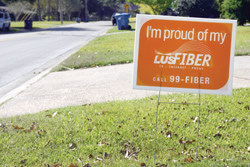
LUS Fiber is Lafayette, La., municipal broadband provider.
During remarks at the National Cable Show in Los Angeles, FCC chairman Thomas Wheeler promised he would stimulate more broadband competition by overriding state laws that presently restrict or ban municipal broadband networks.
“One place where it may be possible is municipally owned or authorized broadband systems. I understand that the experience with community broadband is mixed, that there have been both successes and failures. But if municipal governments—the same ones that granted cable franchises—want to pursue it, they shouldn’t be inhibited by state laws. I have said before, that I believe the FCC has the power – and I intend to exercise that power – to preempt state laws that ban competition from community broadband.”
After making the remarks, a debate has emerged over the exact definition of “preempt.” With at least 20 states limiting or banning community-owned broadband networks, the FCC would have to overturn or invalidate the state laws to render them moot.
At least one judge — Laurence Silberman — believes the FCC has the authority to take “measures that promote competition in the local telecommunications market or other regulating methods that remove barriers to infrastructure investment.” In a footnote, Silberman wrote that “[a]n example of a paradigmatic barrier to infrastructure investment would be state laws that prohibit municipalities from creating their own broadband infrastructure to compete against private companies.”
A FCC spokesperson, in response to inquiries about Wheeler’s remarks, was less conclusive.
“It’s too early to say how [Wheeler] will address existing state laws,” said the spokesperson.
That leaves open the question about whether the FCC intends to cancel existing state laws or simply prohibit new ones from being enacted. That distinction could make a tremendous difference in states like North Carolina, where a fierce battle over protecting municipal broadband was lost when Republicans took control of the state government. Telecom lobbyists, often working under the auspices of the American Legislative Exchange Council (ALEC) have either directly banned municipal broadband networks from getting off the ground or placed so many restrictions on service to make projects untenable.
The Consumerist points out in Pennsylvania, municipal broadband is only allowed in communities if a telephone company does not provide any type of broadband to anyone in their service area. In Nevada, only towns with fewer than 25,000 people or counties with 50,000 can host community-owned broadband networks — numbers likely too low to sustain such a venture financially.


 Subscribe
Subscribe
If this happened, it would solve the network neutrality issue.
Every town that was getting throttled would get a municipal ISP, and they wouldn’t throttle, which would end up beating Comcast.
Comcast would have to end throttling in order to compete, or offer lower prices- free market in action.
Maybe someday people in Washington are going to wake up to how mad Americans are about broadband disinvestment